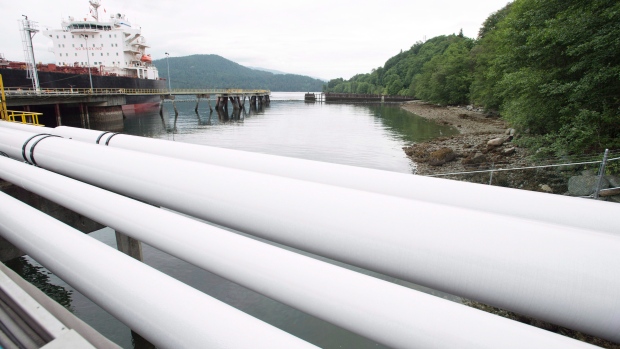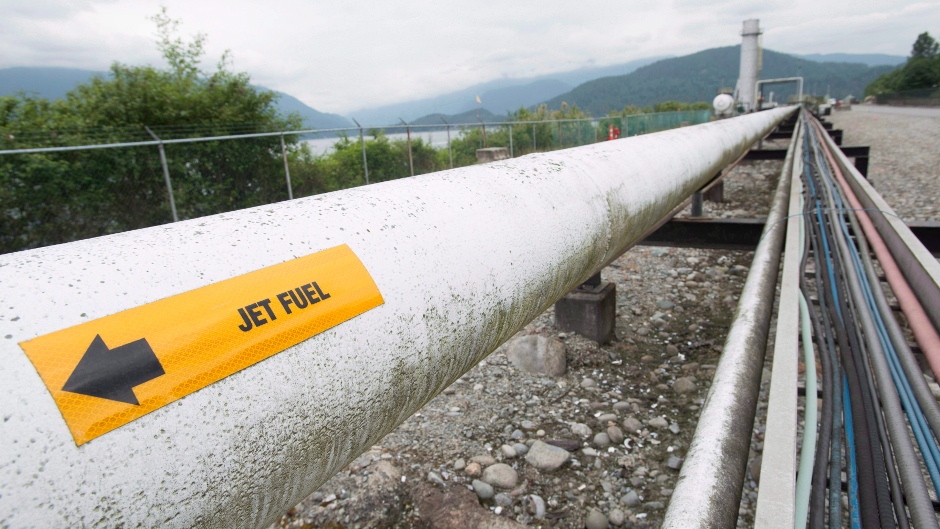Jan 31, 2018
Why the oil sands’ future hangs in the balance as B.C. mixes pipelines and politics

After nearly six years of struggling to rally support, what happens in the next month could finally decide the Trans Mountain pipeline expansion’s fate.
Making good on a central campaign promise, the NDP-led government of British Columbia proposed new regulations on Tuesday that would, among other things, restrict the increase of diluted bitumen transportation through Canada’s westernmost province.
While Kinder Morgan’s $7.5-billion plan to nearly triple Trans Mountain’s capacity to 790,000 barrels per day was not mentioned specifically, the fact that the existing pipeline ships diluted bitumen from Alberta’s oil sands makes it the obvious target.
Hanging in the balance is the future of the oil sands.
Not only is the Trans Mountain expansion expected to handle roughly half of the more than one million new barrels of daily production expected to be coming from northern Alberta by 2020, but the project also represents the only pipeline plan left that is capable of diversifying Canada’s crude oil export markets beyond the United States.
TransCanada’s Energy East pipeline was supposed to provide Canadian crude with another global export outlet, but that million-barrel-per-day plan was killed in October 2017. The company blamed regulatory uncertainty for its decision and former TransCanada CEO Hal Kvisle told BNN via email the Trans Mountain expansion “could very well suffer the same fate.”
Kinder Morgan, for its part, has been increasingly clear in its own threat to pull the plug on the project.
“Faced with unreasonable regulatory risk due to a lack of clear processes to secure necessary permits… it may become untenable for Trans Mountain’s shareholders… to proceed,” reads part of a Kinder Morgan Canada regulatory filing from Nov. 14, 2017.
Last month, the company announced 2018 spending plans would have to focus on the permitting process instead of full-blown construction as it originally planned, and Kinder Morgan later warned the expansion’s startup could be delayed more than a year to December 2020.
Despite the B.C. plan being at least a month or more away from actually becoming policy, Alberta Premier Rachel Notley is warning the proposal alone is enough to cause economic harm.
“Rash actions like these send a message to the world that in B.C. and in Canada the rules are not what they might seem, and therefore jeopardize investment decisions and thousands of jobs,” Notley said in a statement released in response to B.C.’s proposal.
“Job creators need to be able to trust lawmakers,” she added. “[Tuesday’s] announcement suggests that in B.C. they cannot.”
Kinder Morgan certainly trusted the former Liberal-led B.C. government last year, when it agreed to pay the province roughly one billion dollars over the first two decades of Trans Mountain’s expanded operations in exchange for provincial support. Then Christy Clark’s government fell and when B.C. NDP Leader John Horgan became premier – with the support of Green Party Leader Andrew Weaver – he vowed to “use every tool in the toolbox” to block the project.
Tuesday’s proposal marked the latest tool B.C. has pulled out of its toolbox, even if it is a tool the province is legally prevented from using. Pipelines that cross provincial boundaries are federal jurisdiction and Ottawa signed off on the Trans Mountain expansion in November 2016, which is why Notley argues B.C.’s proposal represents the province assuming “powers for itself that it does not have.”
CIBC’s research team agrees with the view that B.C. would be overstepping its authority if it acts on its proposals.
“At the risk of being dismissive, as the [Trans Mountain expansion] is critical to our investment thesis, the announcement does not alter our view that it is a project under federal jurisdiction,” analyst Robert Catellier wrote in a note to clients on Wednesday. “As such, we continue to take the view that the doctrine of federal paramountcy continues to apply.”
Trans Mountain “remains in the national interest,” federal Natural Resources Minister Jim Carr said in a statement on Tuesday. While he added the government stands by its November 2016 decision, Carr gave no indication about whether Ottawa would seek to override any restrictions B.C. might attempt to impose.
“We need to see strong leadership and a rapid response from the prime minister and our Canadian government,” Kvisle said. “This is a national economic emergency.”
HAVE YOUR SAY




